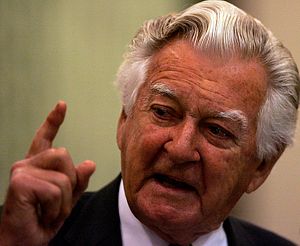The death of Bob Hawke on the eve of the Australian federal elections has deprived the country of one of its most prominent and respected post-war voices. Hawke’s term as prime minister, which extended nearly nine years, through four elections from 1983 to 1991, left a lasting legacy on the Australian identity, way of life, and its changing role in the world stage.
Hawke’s Labor government introduced seminal policies including Medicare, Australia´s current system of publicly funded universal healthcare; liberalized the Australian economy; and recommended the adoption of “Advance Australia Fair” as the country´s national anthem, replacing “God Save the Queen.”
Robert James Lee Hawke was born on December 9, 1929 in South Australia. His father was a Congregationalist minister and his mother was a schoolteacher. He started his political apprenticeship at the Australian Council of Trade Unions (ACTU), having completed his legal education at the University of Western Australia. He then attended the University of Oxford, where he was a Rhodes Scholar. Hawke was later elected president of the ACTU and there, he earned a reputation as a shrewd, combative, and charismatic campaigner, who quickly gained a strong national profile. Hawke’s work at the ACTU included the landmark annual wages case, which resulted in the national wages tribunal ruling in favor of an increase in the national annual wage.
Hawke entered politics in 1980, winning a parliamentary election in Willis, a Labor safe seat in Melbourne, Victoria and was soon appointed to the shadow cabinet by Opposition Leader Bill Hayden. Three years later, Hawke would defeat Hayden and become leader of the Labor Party one month before the 1983 general election. Hawke then led Labor to a landslide victory in the federal election, defeating incumbent Prime Minister Malcolm Fraser. Hawke thus assumed office as the 23rd prime minister of Australia.
In partnership with his treasurer, Paul Keating, who would later succeed him as prime minister, Hawke deregulated the Australian economy, removing protective tariffs and floating the Australian dollar on the international market. The rigid tax and license systems were overhauled and foreign banks were allowed entry into Australia.
Hawke was extremely aware of the need for change and better regulation to protect the Australian environment. His administration’s decision to stop the damming of the Franklin River in Tasmania changed the landscape of the Australian environmental movement. A nonviolent protest blocking access to the river had gained widespread attention and Hawke’s promise to stop the damming, if elected, had been a key moment in the election campaign.
The Hawke government also supported the national Landcare movement, the concept of grassroots communities supporting sustainable development policies and repairing the natural environments in which they are based. Hawke declared the 1990s to be the decade of Landcare and significantly increased funding for federal and regional Landcare programs.
At the international level, Hawke, along with then-French Prime Minister Michel Rocard, introduced a proposal that was adopted as the Madrid protocol, which unambiguously banned mining in Antarctica. Currently, 53 states have acceded to the treaty, with 24 states enjoying nonconsultative status.
On the human rights front, Hawke, who was a prominent voice against the Apartheid regime from his time at the ACTU, introduced sanctions against South Africa and prevented the entry of touring sports teams that were racially divided.
Eventually, economic stagnation and division within his party led to him being replaced by Paul Keating as leader of the Labor Party. Keating, who had challenged Hawke unsuccessfully for the leadership before, would become the 24th prime minister of Australia in 1991. Hawke resigned from the Parliament in 1992 and retired from politics.
Even in retirement, he continued to be vocal and visible, taking strong positions on many of the contentious issues of the time, and became a mentor to many future Labor leaders. He strongly opposed Australia’s involvement in the Iraq war and supported the movement calling for Australia’s transformation to a republic.
Known for his strong passion for beer (he once held a world record for the fastest drinking of a yard of beer) and cricket, Bob Hawke enjoyed rare affection from the Australian public, who saw him as immensely identifiable. His consensus-based approach to governance also won him admirers from across the Australian political spectrum.
However, behind the uniquely crafted public persona, there were battles with alcoholism and personal turmoil after accusations of infidelity led to the breakdown of his first marriage with Hazel Hawke, the mother of his four children. Hawke would later separate from Hazel, who was well respected by the Australian public, and marry his biographer, Blanche d’Alpuget, in 1995. He later spent time with an ailing Hazel at her bedside during her final days. Hawke remained married to Blanche until his death.
Kiran Mohandas Menon has written on international politics and law, with a focus on the Asia- Pacific and southern Europe, for various international publications, including The Diplomat. He is currently working at the International Nuremberg Principles Academy. The views expressed in this piece are his own.

































